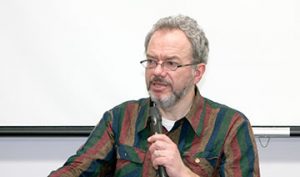
Audio
Download
Veranstaltungsort
Deutsches Institut für Japanstudien
Jochi Kioizaka Bldg. 2F
7-1 Kioicho
Chiyoda-ku, Tokyo 102-0094
Japan
Zugang
Anmeldung
Knowing one's Enemy: Japan's Korean Community, and Those Who Hate Them
6. Februar 2014 / 19:00 Uhr
Tom Gill, Professor, Meiji Gakuin University
The recent upsurge in concern about hate speech has largely focused on a relatively new right-wing group, the Zaitokukai, short for ‘Zainichi Tokken o Yurusanai Shimin no Kai’, meaning ‘the Citizen’s Association that rejects special privileges for Japan-resident (Koreans)’. Officially, this organization has the limited and specific objective of eliminating the legal apparatus which gives special privileges to members of Japan’s Korean community. This is one face of the Zaitokukai: a pressure group lobbying for the correction of what it sees as a social injustice.
The other face of Zaitokukai is the violent hatred expressed against Koreans in street demonstrations, deliberately held in urban districts with large Korean populations, describing Koreans as vermin, calling for them to be killed, and displaying fascist symbols. The leadership of Zaitokukai has not distanced itself from these extremist displays. Clearly we need to look at events on the street, considering not only the meaning of words, but also the way they are uttered, the places where they are heard, and non-verbal expressions such as flags and placards.
But we also need to examine the Zaitokukai’s official face. Though the stress on removing special privileges may be a cynical ploy to gain political respectability, the fact remains that the Japanese state’s creation of the category of “special permanent resident” (tokubetsu eijūsha), and its almost-exclusive application to Japan’s pre-war Korean minority and their descendants, has made Koreans an easier target for the Zaitokukai. We need to study the Korean minority in Japan, what their ‘privileges’ are, how they were won and why they are controversial now.
Tom Gill is Professor of Social Anthropology at the Faculty of International Studies, Meiji Gakuin University. He received his Ph.D. from the London School of Economics and Political Science (1996). His research interests include casual labour, poverty, minority issues and the Fukushima nuclear disaster. He is the author of Men of Uncertainty: the Social Organization of Day Laborers in Contemporary Japan (2001), translator of Yasunori Fukuoka’s Lives of Young Koreans in Japan (2000) and co-editor of Japan Copes with Calamity: Ethnographies of the Earthquake, Tsunami and Nuclear Disasters of March 2011 (2013).